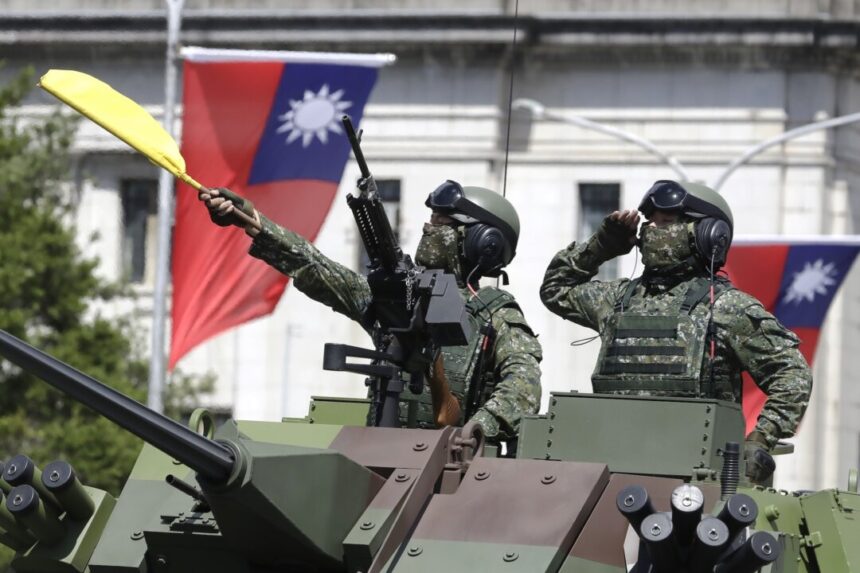The United States has approved a nearly $2 billion arms sale to Taiwan, including two radar upgrade packages and, for the first time ever, an advanced surface-to-air missile system that has been battle-tested in Ukraine.
The Defense Security Cooperation Agency (DSCA) announced the deal on Oct. 25, marking the largest single military sale to Taiwan during President Joe Biden’s administration and the 17th overall since 2021.
“This proposed sale serves U.S. national, economic, and security interests by supporting the recipient’s continuing efforts to modernize its armed forces and to maintain a credible defensive capability,” the DSCA said in a statement, adding that the deal would contribute to regional military balance and ensure interoperability between U.S. and Taiwanese forces.
Congress has been notified of the proposed sale, consistent with the Taiwan Relations Act, which guides arms sales to Taiwan. While the United States ended formal diplomatic ties with Taiwan in 1979 and switched recognition to Beijing under its One China policy, Washington has maintained a robust unofficial relationship with Taipei and has pledged to provide it with the arms necessary to defend itself.
The proposed arms sale, which Congress has 30 days to review before it becomes final, consists of three components: the National Advanced Surface-to-Air Missile System (NASAMS), valued at $1.16 billion, and two radar systems (AN/TPS-77 and AN/TPS-78), which account for $828 million.
The NASAMS package includes three missile systems designed to provide medium-range air defense, improving Taiwan’s capabilities against potential threats. It also features Sentinel radar systems, 123 Advanced Medium-Range Air-to-Air Missiles-Extended Range, and additional fire control and tactical communication systems. The DSCA said that the sale would boost Taiwan’s ability to defend its airspace and strengthen regional stability.
“The proposed sale will improve the recipient’s capability to meet current and future threats by contributing to the recipient’s abilities to defend its airspace, provide regional security, and increase interoperability with the United States through its NASAMS program,” the DSCA said in a statement.
The radar upgrades involve the procurement of the AN/TPS-77 and AN/TPS-78 turnkey systems. These radar systems are intended to enhance Taiwan’s medium- to long-range air surveillance capabilities, a critical need as tensions with China continue to rise. The U.S. Air Force will procure these radars, with training, spare parts, and logistical support also comprising part of the package. The DSCA noted that Taiwan is expected to absorb the new systems seamlessly into its armed forces, with no adverse impact on U.S. defense readiness.
Implementation of the NASAMS system will require 26 U.S. government representatives and 34 contractors to support the deployment, while the radar upgrades will not require additional personnel on the ground in Taiwan.
Raytheon, based in Andover, Massachusetts, will be the principal contractor for the NASAMS.
Taiwan’s presidential spokesperson Karen Kuo expressed gratitude to the U.S. government for continuing to provide it with weaponry it needs, saying in a statement on Oct. 26 that the sale demonstrates “unwavering” commitment to Taiwan’s security on the part of the United States.
“Taiwan will continue to strengthen its self-defense capabilities as it works to maintain the rules-based international order, ensuring the peace, stability, and prosperity of the Indo-Pacific region,” Kuo said, adding that the sale is consistent with both the Taiwan Relations act and the so-called six assurances.
The six assurances, which were formulated under President Ronald Reagan’s administration, include not setting an end date for arms sales to Taiwan and not putting pressure on it to enter into negotiations with China. Taiwan is viewed by China as a breakaway province that must eventually be reunited with the mainland.
While there was no immediate reaction from Chinese officials to the proposed sales, Beijing has repeatedly condemned U.S. arms sales to Taiwan, arguing they undermine China’s sovereignty and escalate tensions across the Taiwan Strait.
U.S. officials maintain that the sales are defensive in nature and consistent with longstanding U.S. policy to provide Taiwan with the weapons systems it needs for self-defense.
The announcement of the proposed sale follows China’s war games last week that encircled Taiwan and practiced sealing off key ports and areas. Taiwanese officials said they counted a record one-day total of 153 Chinese aircraft, 14 navy vessels, and 12 other ships. Please rewrite this sentence.
Source link





